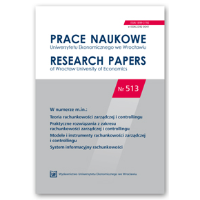CENTRALNY REJESTR FAKTUR I ZMIANY W PRZEPISACH KARNYCH I KARNYCH SKARBOWYCH JAKO SPOSOBY OGRANICZANIA ZJAWISKA „PUSTYCH FAKTUR”
A CENTRAL VAT INVOICE REGISTER AND CHANGES IN PENAL AND FISCAL PENAL LAWS AS A WAY OF LIMITING THE PHENOMENON OF FICTITIOUS INVOICES
Author(s): Anna Ćwiąkała-Małys, Iwona PiotrowskaSubject(s): Criminal Law, Law on Economics, Fiscal Politics / Budgeting
Published by: Wydawnictwo Uniwersytetu Ekonomicznego we Wrocławiu
Keywords: grey area; tax system; false invoices; VAT tax extortion; Central Invoice Register; Fiscal Penal Code; Penal Code;
Summary/Abstract: The most important task of tax and fiscal authorities, after introducing National Revenue Administration in March 2017, is to prevent VAT tax extortion. One of the elements of the extortion mechanism is introducing false invoices into economic turnover by entrepreneurs. These documents do not reflect real economic operations and are made out intentionally or not and are a part of criminal operations. One of undertaken actions to prevent incorrectness in this area is an increase of penalties in Fiscal Penal Code and in Penal Code. A tool that will enhance uncovering incorrectness is about to be electronic Central Invoice Register. This is a repository of data where all the invoice will be gathered. It will allow controlling organs to counteract and find carousel fraud, to identify false and incorrect invoices and finally effectively penalize participants of this operation.
Journal: Prace Naukowe Uniwersytetu Ekonomicznego we Wrocławiu
- Issue Year: 2018
- Issue No: 513
- Page Range: 88-98
- Page Count: 11
- Language: Polish

